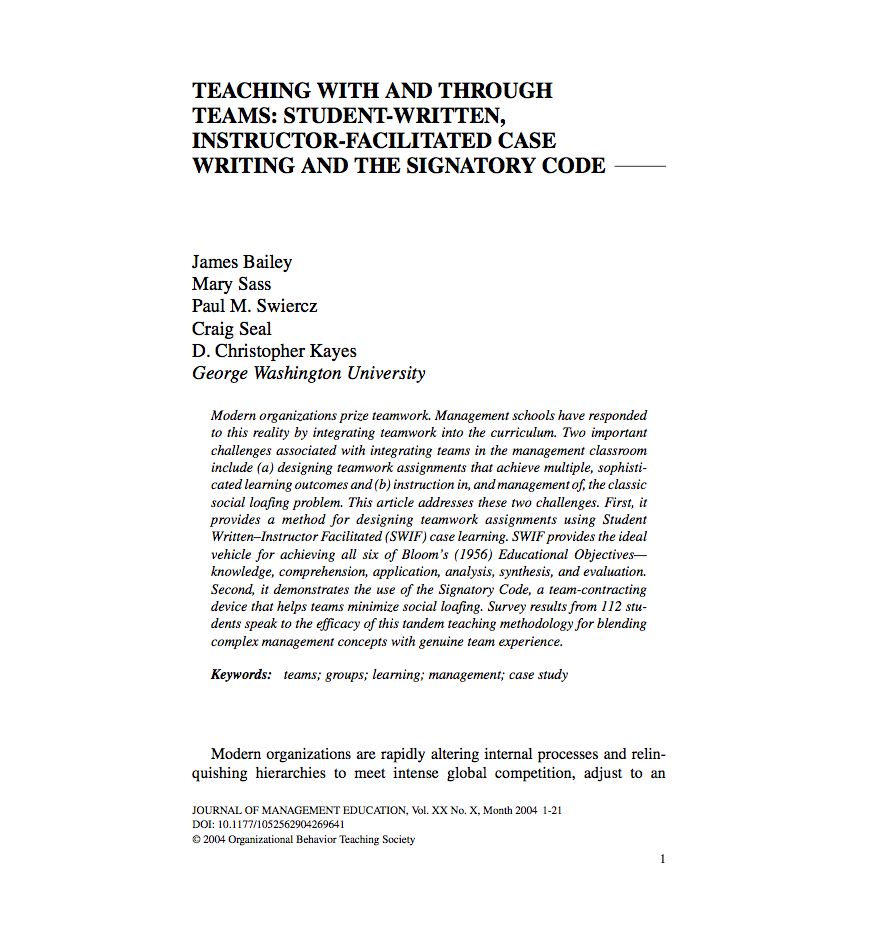Selected Academic Articles
by Dr. James Bailey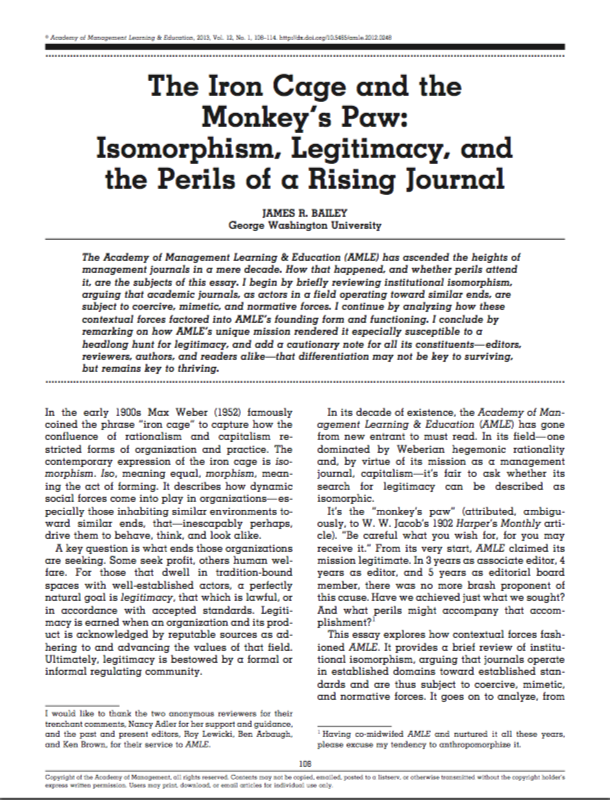
The Iron Cage and the Monkey’s Paw
By James Bailey
Academy of Management Learning & Education – 2013
The Academy of Management Learning & Education (AMLE) has ascended the heights of management journals in a mere decade. How that happened, and whether perils attend it, are the subjects of this essay. I begin by briefly reviewing institutional isomorphism, arguing that academic journals, as actors in a field operating toward similar ends, are subject to coercive, mimetic, and normative forces. I continue by analyzing how these contextual forces factored into AMLE’s founding form and functioning. I conclude by remarking on how AMLE’s unique mission rendered it especially susceptible to a headlong hunt for legitimacy, and add a cautionary note for all its constituents—editors, reviewers, authors, and readers alike—that differentiation may not be key to surviving, but remains key to thriving.
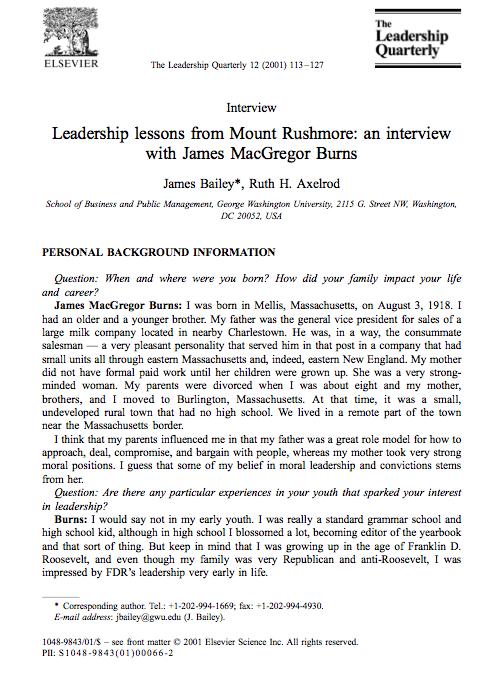
Leadership Lessons from Mount Rushmore: An Interview with James MacGregor Burns
By James Bailey & Ruth H. Axelrod
Leadership Quarterly – 2001
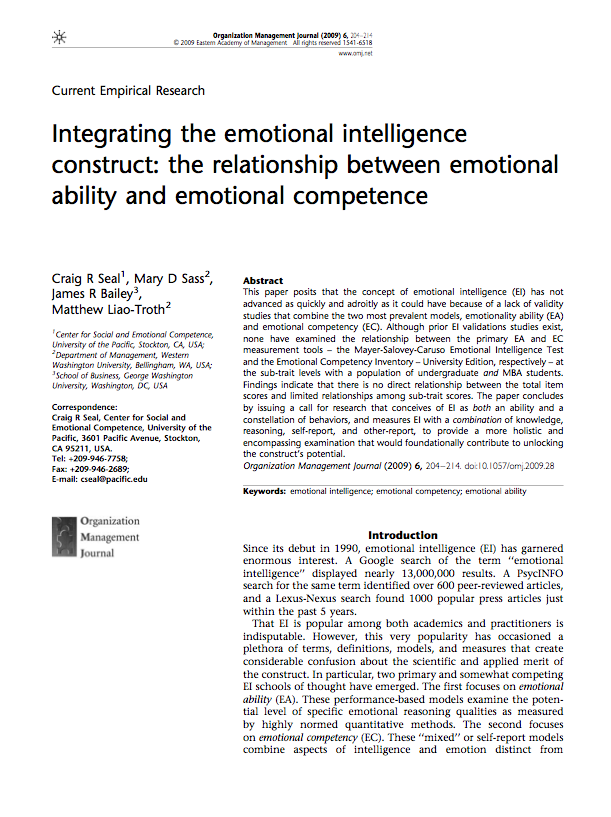
Integrating the Emotional Intelligence Construct: The Relationship Between Emotional Ability and Emotional Competence
By Craig R Seal, Mary D Sass, James R Bailey, & Matthew Liao-Troth
Organization Management Journal – 2009
This paper posits that the concept of emotional intelligence (EI) has not advanced as quickly and adroitly as it could have because of a lack of validity studies that combine the two most prevalent models, emotionality ability (EA) and emotional competency (EC). Although prior EI validations studies exist, none have examined the relationship between the primary EA and EC measurement tools – the Mayer-Salovey-Caruso Emotional Intelligence Test and the Emotional Competency Inventory – University Edition, respectively – at the sub-trait levels with a population of undergraduate and MBA students. Findings indicate that there is no direct relationship between the total item scores and limited relationships among sub-trait scores. The paper concludes by issuing a call for research that conceives of EI as both an ability and a constellation of behaviors, and measures EI with a combination of knowledge, reasoning, self-report, and other-report, to provide a more holistic and encompassing examination that would foundationally contribute to unlocking the construct’s potential.
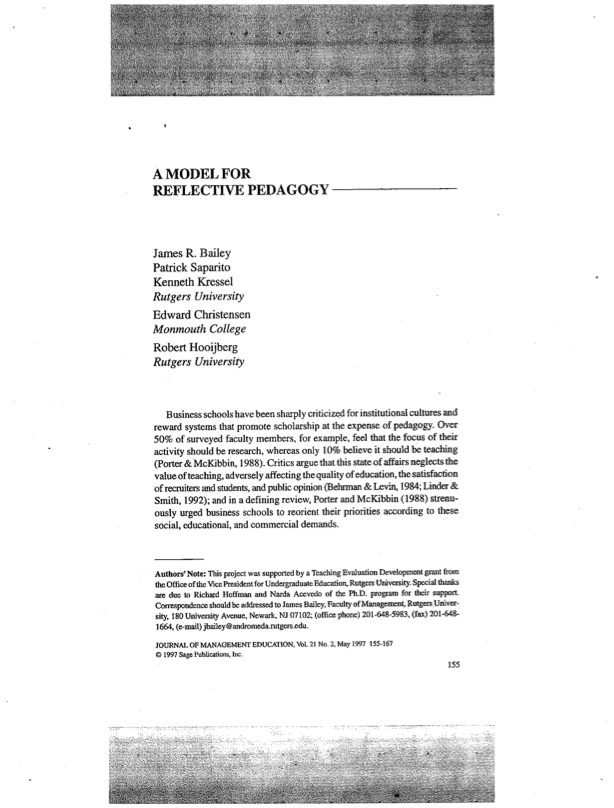
A Model for Reflective Pedagogy
By James R Bailey, Patrick Saparito, Kenneth Kressel, Edward Christensen, Robert Hooijberg
Journal of Management Education – May 1997
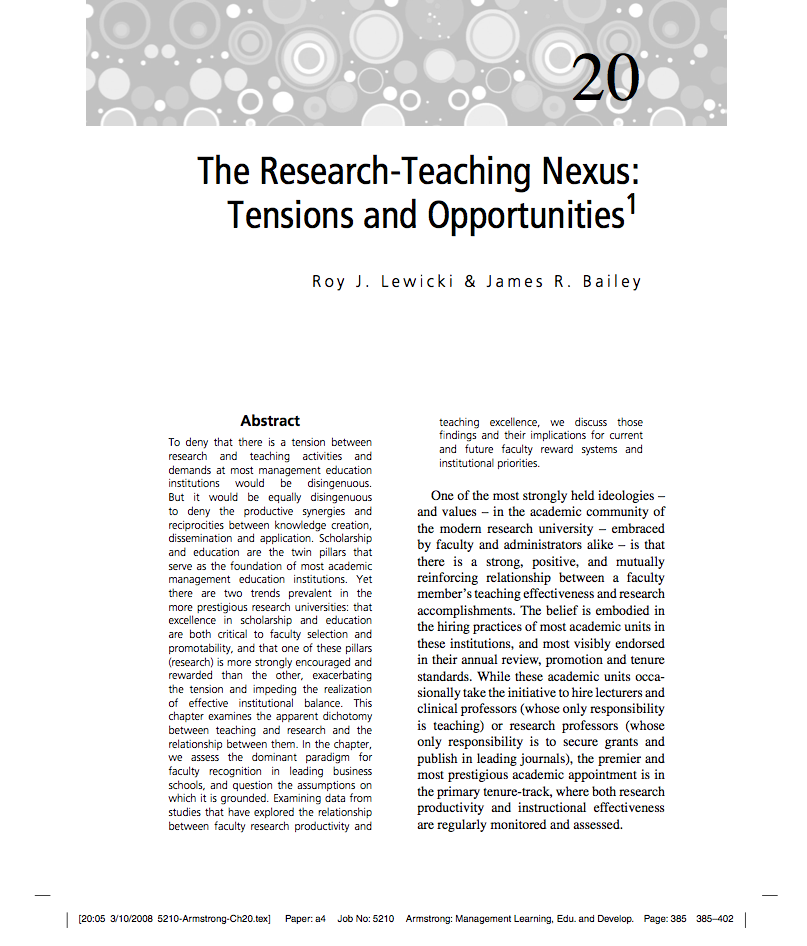
The Research-Teaching Nexus: Tensions and Opportunities
By Roy J. Lewicki & James R Bailey
The Sage Handbook of Management Learning, Education and Development – 2008
To deny that there is a tension between research and teaching activities and demands at most management education institutions would be disingenuous. But it would be equally disingenuous to deny the productive synergies and reciprocities between knowledge creation, dissemination and application. Scholarship and education are the twin pillars that serve as the foundation of most academic management education institutions. Yet there are two trends prevalent in the more prestigious research universities: that excellence in scholarship and education are both critical to faculty selection and promotability, and that one of these pillars (research) is more strongly encouraged and rewarded than the other, exacerbating the tension and impeding the realization of effective institutional balance. This chapter examines the apparent dichotomy between teaching and research and the relationship between them. In the chapter, we assess the dominant paradigm for faculty recognition in leading business schools, and question the assumptions on which it is grounded. Examining data from studies that have explored the relationship between faculty research productivity and teaching excellence, we discuss those findings and their implications for current and future faculty reward systems and institutional priorities.
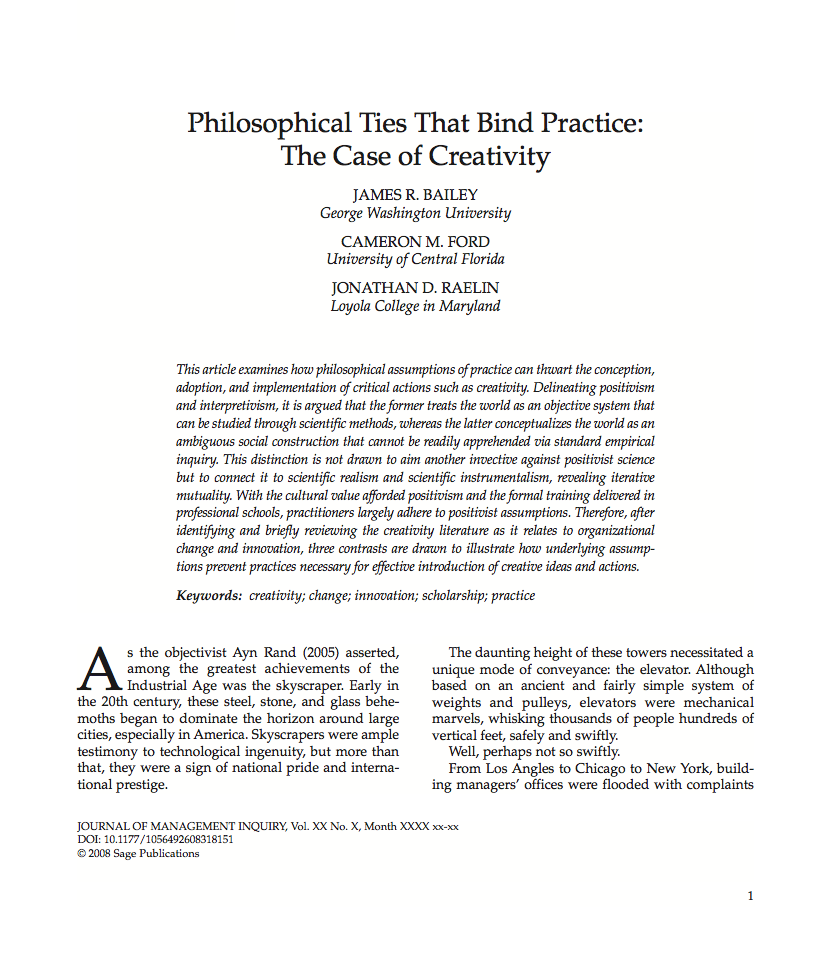
Philosophical Ties That Bind Practice: The Case of Creativity
By James R Bailey, Cameron M. Ford & Jonathan D. Raelin
The Journal of Management Inquiry – 2008
This article examines how philosophical assumptions of practice can thwart the conception, adoption, and implementation of critical actions such as creativity. Delineating positivism and interpretivism, it is argued that the former treats the world as an objective system that can be studied through scientific methods, whereas the latter conceptualizes the world as an ambiguous social construction that cannot be readily apprehended via standard empirical inquiry. This distinction is not drawn to aim another invective against positivist science but to connect it to scientific realism and scientific instrumentalism, revealing iterative mutuality. With the cultural value afforded positivism and the formal training delivered in professional schools, practitioners largely adhere to positivist assumptions. Therefore, after identifying and briefly reviewing the creativity literature as it relates to organizational change and innovation, three contrasts are drawn to illustrate how underlying assump- tions prevent practices necessary for effective introduction of creative ideas and actions.
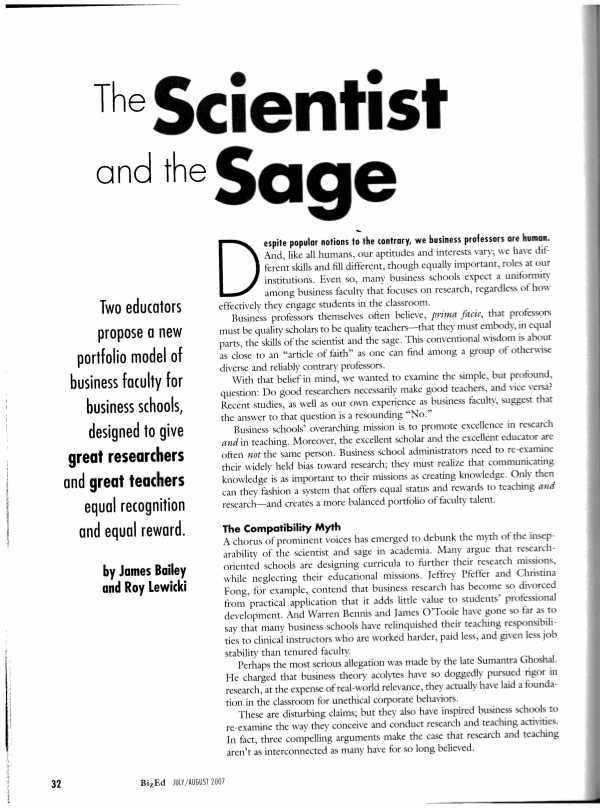
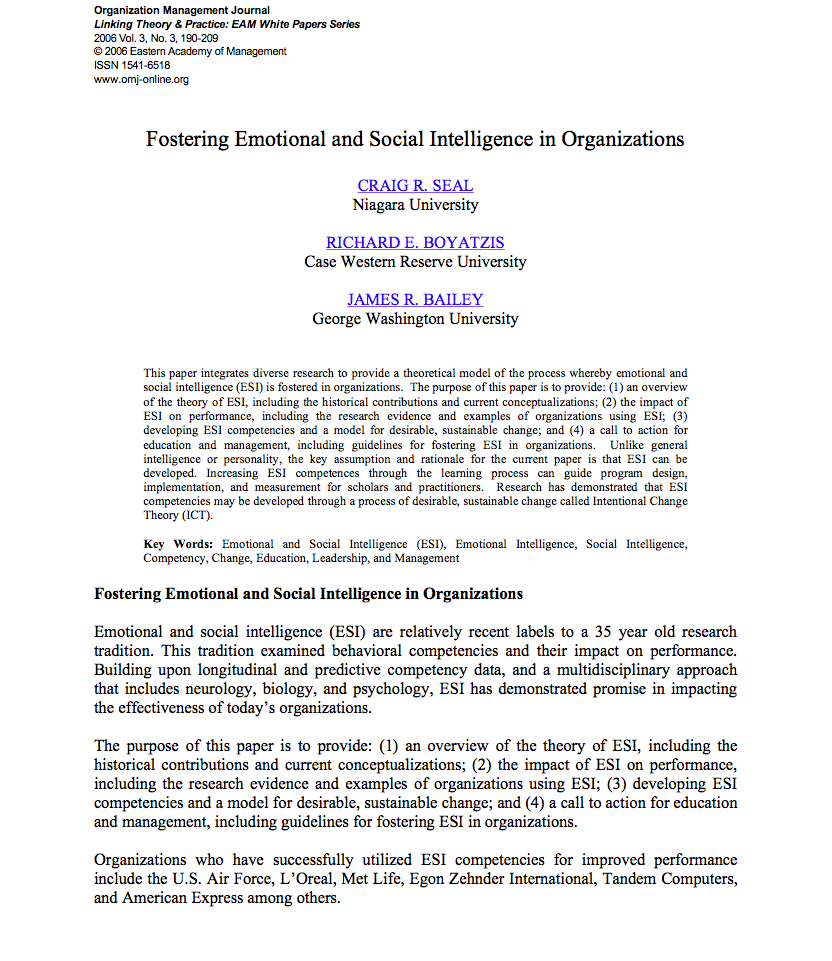
Fostering Emotional and Social Intelligence in Organizations
By Craig R. Seal, Richard E. Boyatzis & James R Bailey
Organizational Management Journal – 2006
This paper integrates diverse research to provide a theoretical model of the process whereby emotional and social intelligence (ESI) is fostered in organizations. The purpose of this paper is to provide: (1) an overview of the theory of ESI, including the historical contributions and current conceptualizations; (2) the impact of ESI on performance, including the research evidence and examples of organizations using ESI; (3) developing ESI competencies and a model for desirable, sustainable change; and (4) a call to action for education and management, including guidelines for fostering ESI in organizations. Unlike general intelligence or personality, the key assumption and rationale for the current paper is that ESI can be developed. Increasing ESI competences through the learning process can guide program design, implementation, and measurement for scholars and practitioners. Research has demonstrated that ESI competencies may be developed through a process of desirable, sustainable change called Intentional Change Theory (ICT).
Download PDF
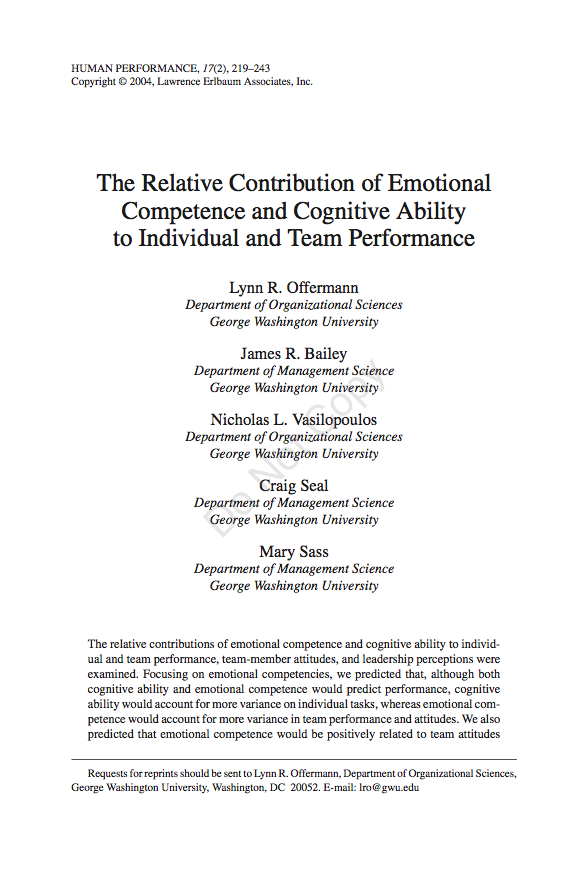
The Relative Contribution of Emotional Competence and Cognitive Ability to Individual and Team Performance
By Lynn R. Offermann, James R Bailey, Nicolas L. Vasilopouls, Craig Seal & Mary Sass
Human Performance – 2004
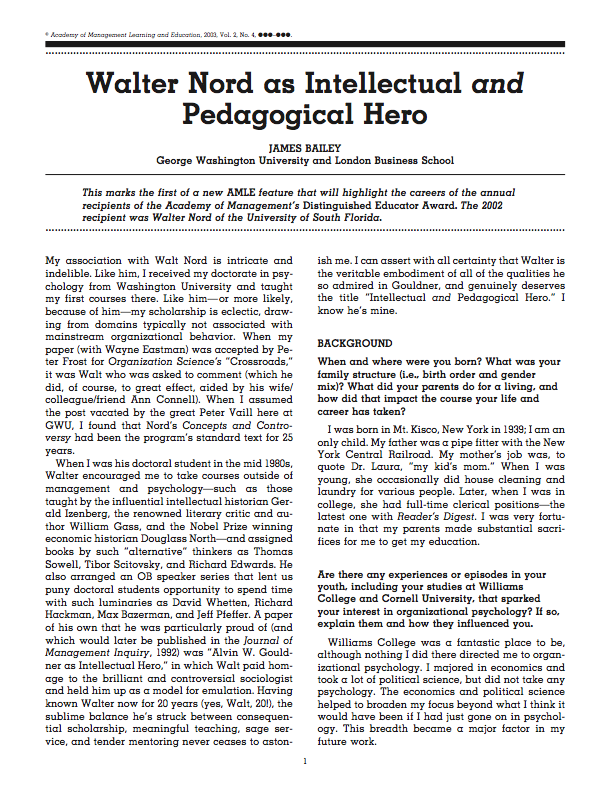
Walter Nord as Intellectual and Pedagogical Hero

